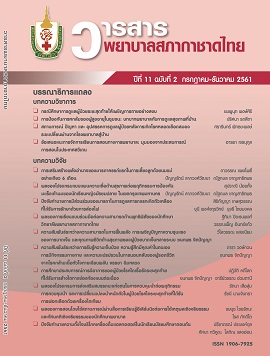Suggestion for Teaching in Nursing: Points of View from Teaching Experiences in Sweden
Keywords:
teaching, teaching experiences, nursingAbstract
Teaching in nursing at the present needs to change to align with complex and diverse health problems and care needs. Nursing education must prepare nursing students, to develop into a complete individual – in body, mindset, intellect, morality, ethics, and cultural life as well as concerning individual differences. Students also need to develop the ability to apply knowledge and skills in the real world setting to solve problems. Therefore, the curriculum should focus on the learning process by organizing contents and activities in line with a broad knowledge of the wider world, analytical skills and self-understanding, and by taking into account the interests and aptitudes of the students. The teacher must change and develop the ways of teaching in accordance with the features of a modern education in the 21st century. The development of teaching and learning can occur from the exchange of knowledge and experience. Teaching experience in Sweden enabled the author to develop nursing teaching techniques by learning from such insights.
References
2. Office of the Education Council. The national scheme of education B.E. 2560-2579 (2017-2036) [Internet]. 2017 [cited 2018 May 24]. Available from: https://www.onec.go.th/us.php/home/category/CAT0001145 (in Thai)
3. Dechakup P, Yindeesuk P, Meesri RS. Project-based teaching-integrated teaching for 21st century skills. Bangkok: Chulalongkorn University of Printing; 2013. (in Thai)
4. Wattanapa P. Health education for the 21st century: from concept to practice. In: Annual conference 2013. (Subproject 1) Title “Nursing education for the 21st century”. 2013 Feb 12-13; Amari Airport Hotel, Bangkok; 2013. p. 14-5. (in Thai)
5. Panich V. Enjoy learning in 21st century. Bangkok: S. Charoen printing; 2013. (in Thai).
6. Partnership for 21st Century Learning. Framework for 21st century learning [Internet]. 2018 [cited 2018 May 15]. Available from: https://www.p21.org/storage/documents/docs/P21_framework_0816.pdf
7. Thompson BW. The connection classroom: using digital technology to promote learning. In: Billings DM, Halstead JA, editors. Teaching in nursing: a guide for faculty (5th ed.). Missouri: Elsevier; 2016. p. 324-41.
8. Thai Nursing Council. Nursing council regulation on approval of professional nursing and midwifery curriculum professional level [Internet]. 2001 [cited 2017 Mar 25]. Available from: https://www.tnc.or.th/content/content-1175.html. (in Thai)
9. Ministry of Education. National education act B.E. 2542 (1999) and amendments (second national education act B.E. 2545 (2002) and third national education act B.E. 2553 (2010)). Bangkok: Express Transportation Organization of Thailand; 2002. (in Thai)
10. Office of the Higher Education Commission. Announcement of Ministry of Education: Thai qualification framework for higher education: nursing B.E. 2560 [Internet]. 2017 [cited 2018 Mar 25]. Available from: https://www.mua.go.th/users/tqfhed/news/FilesNews/FilesNews6/nurse_R.pdf (in Thai)
11. The Thai Red Cross College of Nursing. Bachelor of nursing science program (Revised 2012). Bangkok: The Thai Red Cross College of Nursing; 2012. (in Thai).
12. Allan HT. Using participant observation to immerse oneself in the field: the relevance and importance of ethnography for illuminating the role of emotions in nursing practice. J Res Nurs 2006;11(5):397-407.
13. Malakhonburi C. The improvement of classroom efficiency: a comparison between large, middle and small classroom in College of Politics and Governance, Mahasarakham University. Journal of Politics and Governance 2017;7(3):198-210. (in Thai)
14. Mannino J, Cotter L. Educating nursing students for practice in the 21st century. International Archives of Nursing and Health Care 2016;2(1):26.
15. Philips JM. Strategies to promote student engagement and active learning. In: Billings DM, Halstead JA, editors. Teaching in nursing: a guide for faculty (5th ed.). Missouri: Elsevier; 2016. p. 245-62.
16. Sinlarat P. Teaching strategies according to qualification framework for higher education. Bangkok: Chulalongkorn University of printing; 2016. (in Thai)
17. Lueboonthawatchai O. Critical thinking: nursing teaching. Bangkok: Thana place and graphic; 2000. (in Thai)
18. Rujkornkarn D. Teaching in nursing. Khonkaen: Siripan Office; 1998. (in Thai)
19. Leartbunnapong T. Simulation based medical education. Siriraj Medical Bulletin 2015;1:39-46. (in Thai)
20. Stone R, Cooper S, Cant R. The value of peer learning in undergraduate nursing education: a systematic review. ISRN Nursing 2013:1-10. doi.org/10.1155/2013/930901.
21. Kim J, Park J-H, Shin S. Effectiveness of simulation-based nursing education depending on fidelity: a meta-analysis. BMC Med Educ 2016;16:152. doi: 10.1186/s12909-016-0672-7
22. Hogg G, Miller D. The effects of an enhanced simulation programme on medical students' confidence responding to clinical deterioration. BMC Med Educ 2016;10:161.
23. Lindsey PL, Jenkins S. Nursing students' clinical judgment regarding rapid response: the influence of a clinical simulation education intervention. Nurs Forum 2013;48(1):61-70.
24. Joshi K, Nilawar AB, Thorat AP. Effect of case based learning in understanding clinical biochemistry. IJBAR 2014;5(10):517-18.
25. Fisher ML. Teaching in nursing. In: Billings DM, Halstead JA, editors. Teaching in nursing: a guide for faculty (5th ed.). Missouri: Elsevier; 2016. p. 1-34.
26. Dechakup P, Yindeesuk P. 7C teacher's skills 4.0. Bangkok: Chulalongkorn University of Printing; 2017. (in Thai)
Downloads
Published
Issue
Section
License
เนื้อหาบทความหรือข้อคิดเห็นต่างๆ ในวารสารพยาบาลสภากาชาดไทยนี้ เป็นความคิดเห็นของผู้เขียนบทความ ไม่ใช่ความเห็นของกองบรรณาธิการ หรือสถาบันการพยาบาลศรีสวรินทิรา สภากาชาดไทย






